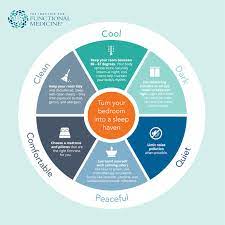Sleep hygiene refers to the practices and habits that promote good quality sleep. Good sleep hygiene is essential for maintaining physical and mental health, as well as improving overall well-being. In this article, we will discuss some of the best practices for promoting good sleep hygiene.
- Stick to a sleep schedule: Going to bed and waking up at the same time every day helps regulate your body’s internal clock, making it easier to fall asleep at night.
- Create a sleep-conducive environment: Make sure your bedroom is cool, dark, and quiet. Use comfortable bedding and pillows that support good posture.
- Limit exposure to electronic devices before bedtime: The blue light emitted by electronic devices such as smartphones, tablets, and computers can disrupt your body’s natural production of melatonin, which is essential for sleep.
- Avoid caffeine and alcohol before bedtime: Caffeine is a stimulant that can keep you awake, while alcohol may help you fall asleep initially but can disrupt your sleep later in the night.
- Exercise regularly: Regular exercise can help improve sleep quality by reducing stress and anxiety levels.
- Practice relaxation techniques: Techniques such as deep breathing exercises or meditation can help calm your mind and prepare you for sleep.
- Limit naps during the day: While short naps can be beneficial for some people, longer naps during the day can interfere with nighttime sleep patterns.
- Avoid eating heavy meals before bedtime: Eating a heavy meal close to bedtime can cause discomfort and make it difficult to fall asleep.
In conclusion, good sleep hygiene is essential for maintaining physical and mental health. By following these simple practices, you can improve the quality of your sleep and wake up feeling refreshed and energized each morning. If you continue having trouble sleeping despite practicing good sleep hygiene, consult with a healthcare professional who may be able to provide additional guidance or treatment options.
6 Tips for Better Sleep Hygiene: Establishing a Consistent Sleep Schedule, Relaxing Pre-Sleep Routine, Avoiding Late-day Caffeine, Regular Exercise, Limiting Screen Time, and Creating a Comfortable Sleep Environment
- Establish a consistent sleep schedule
- Create a relaxing pre-sleep routine
- Avoid caffeine late in the day
- Exercise regularly
- Limit screen time before bed
- Make your bedroom comfortable and dark
Establish a consistent sleep schedule
Establishing a consistent sleep schedule is a crucial aspect of good sleep hygiene. Our bodies have an internal clock, known as the circadian rhythm, which regulates our sleep-wake cycle. When we maintain a consistent sleep schedule, we help our bodies synchronize with this internal clock, making it easier to fall asleep at night and wake up in the morning.
When we go to bed and wake up at different times each day, it can disrupt our circadian rhythm and cause difficulty falling asleep or staying asleep. This can lead to daytime fatigue, decreased productivity, and overall decreased well-being.
To establish a consistent sleep schedule, choose a bedtime that allows for 7-9 hours of sleep each night and stick to it as closely as possible every day, even on weekends. It may take some time for your body to adjust to the new schedule, but with consistency, it will become easier to fall asleep and wake up naturally without the need for an alarm clock.
In addition to establishing a consistent sleep schedule, it’s important to create a relaxing bedtime routine that helps signal to your body that it’s time for sleep. This could include activities such as reading a book or taking a warm bath.
By prioritizing good sleep hygiene practices such as establishing a consistent sleep schedule, you can improve your overall well-being and feel more rested and energized each day.
Create a relaxing pre-sleep routine
Creating a relaxing pre-sleep routine is an essential aspect of good sleep hygiene. A pre-sleep routine helps your body and mind prepare for sleep, making it easier to fall asleep and stay asleep throughout the night.
A relaxing pre-sleep routine can include activities such as taking a warm bath or shower, reading a book, practicing meditation or deep breathing exercises, or listening to calming music. These activities can help calm your mind and reduce stress levels, which are common causes of insomnia.
It’s also important to avoid activities that can interfere with sleep during your pre-sleep routine. For example, avoid using electronic devices such as smartphones or tablets before bedtime as they emit blue light that can disrupt your body’s natural production of melatonin.
Creating a consistent pre-sleep routine is key to promoting good sleep hygiene. Try to establish a regular bedtime and wake-up time and stick to it even on weekends. This consistency helps regulate your body’s internal clock and makes it easier to fall asleep at night.
In conclusion, creating a relaxing pre-sleep routine is an effective way to promote good quality sleep. By incorporating calming activities into your bedtime routine and avoiding activities that interfere with sleep, you can improve the quality of your sleep and wake up feeling refreshed each morning.
Avoid caffeine late in the day
Caffeine is a stimulant that can interfere with the body’s natural sleep-wake cycle. Consuming caffeine late in the day, especially in the evening, can make it difficult to fall asleep and stay asleep. This is because caffeine blocks the effects of adenosine, a chemical that promotes sleep and builds up in the brain throughout the day.
To promote good sleep hygiene, it’s important to avoid consuming caffeine late in the day. This means avoiding coffee, tea, soda, energy drinks, and other caffeinated beverages after mid-afternoon. It’s also important to be aware of hidden sources of caffeine such as chocolate and some medications.
If you’re someone who enjoys drinking coffee or tea later in the day, consider switching to decaf versions or herbal teas that don’t contain caffeine. Alternatively, you can try reducing your overall intake of caffeine throughout the day.
By avoiding caffeine late in the day, you’ll give your body a better chance of naturally winding down and preparing for sleep. This will help you fall asleep faster and enjoy a more restful night’s sleep.
Exercise regularly
Regular exercise is an important component of good sleep hygiene. Exercise can help improve the quality of your sleep by reducing stress and anxiety levels, increasing the time spent in deep sleep, and regulating your body’s internal clock.
Studies have shown that people who exercise regularly tend to fall asleep faster and experience fewer nighttime awakenings than those who are sedentary. Additionally, regular exercise has been linked to improvements in mood, energy levels, and overall well-being.
It’s important to note that the timing of your exercise routine can also impact your sleep quality. While regular exercise is beneficial for improving sleep, exercising too close to bedtime may actually interfere with your ability to fall asleep. Experts recommend finishing your workout at least 2-3 hours before bedtime to allow your body enough time to wind down.
Incorporating regular exercise into your daily routine doesn’t have to be difficult or time-consuming. Simple activities such as taking a brisk walk or doing a few yoga poses before bed can be effective in promoting good sleep hygiene.
In conclusion, regular exercise is an important aspect of maintaining good sleep hygiene. By making physical activity a regular part of your routine and timing it appropriately, you can improve the quality of your sleep and wake up feeling refreshed each morning.
Limit screen time before bed
Limiting screen time before bed is one of the most important tips to follow for good sleep hygiene. The blue light emitted by electronic devices such as smartphones, tablets, and computers can interfere with our body’s natural production of melatonin, a hormone that helps regulate sleep. Exposure to this blue light can make it harder to fall asleep and stay asleep throughout the night.
To avoid this, it is recommended to avoid using electronic devices for at least an hour before bedtime. Instead, try reading a book or engaging in other relaxing activities that do not involve screens. This will help your body relax and prepare for sleep.
If you must use electronic devices before bed, consider using screen filters or adjusting the brightness settings to reduce the amount of blue light emitted. Additionally, some devices now have a “night mode” feature that reduces blue light emissions during nighttime hours.
By limiting screen time before bed, you can improve your sleep quality and wake up feeling more rested and refreshed in the morning. So put down your phone or tablet and pick up a book instead – your body will thank you for it!
Make your bedroom comfortable and dark
Creating a comfortable and dark sleeping environment is an essential aspect of good sleep hygiene. Your bedroom should be a sanctuary where you can relax and unwind from the stresses of the day. Here are some tips for making your bedroom comfortable and dark:
- Invest in comfortable bedding: Choose sheets, blankets, and pillows that are soft and cozy. Make sure they provide adequate support for your body to help prevent discomfort or pain.
- Keep the temperature cool: A cooler room temperature can help promote better sleep quality by allowing your body to regulate its internal temperature more easily.
- Block out noise: If you live in a noisy area or have noisy neighbors, consider investing in earplugs or a white noise machine to block out unwanted sounds.
- Use blackout curtains: These curtains block out any light from outside sources, helping to create a dark environment that is conducive to sleep.
- Limit electronic devices: Avoid using electronic devices such as smartphones, tablets, or laptops in bed as the blue light they emit can interfere with your body’s natural production of melatonin.
By making your bedroom comfortable and dark, you can improve your chances of getting a good night’s sleep. Remember that everyone’s sleeping preferences are different, so it may take some trial and error to find what works best for you. Experiment with different bedding materials, room temperatures, and lighting options until you find what helps you drift off into peaceful slumber each night.



